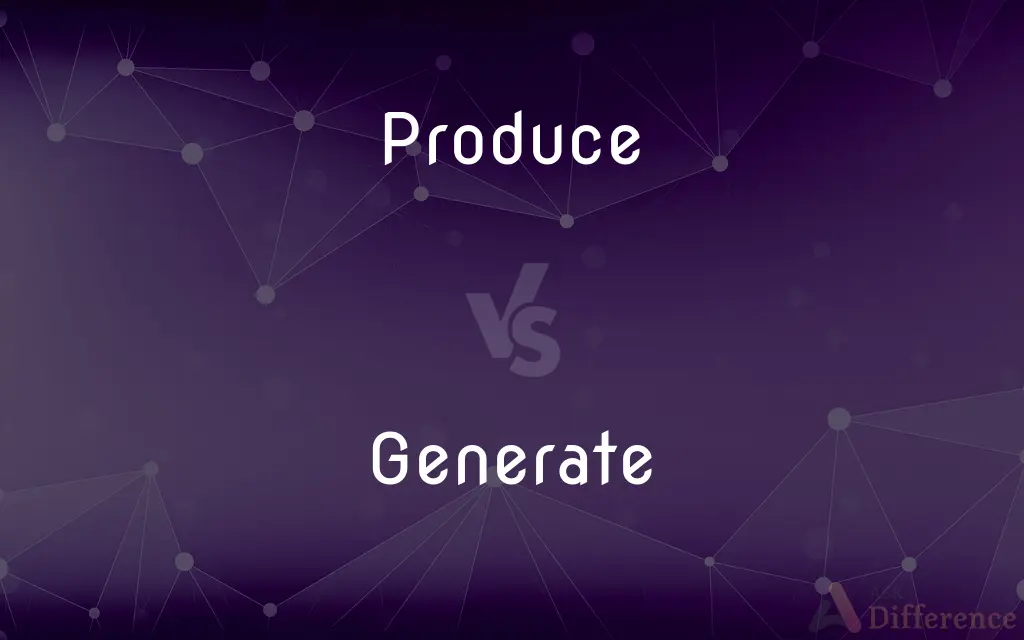Produce vs. Generate — What's the Difference?
By Maham Liaqat & Fiza Rafique — Updated on April 14, 2024
Produce emphasizes creating goods or agricultural outputs, while generate often refers to producing energy or abstract results.

Difference Between Produce and Generate
Table of Contents
ADVERTISEMENT
Key Differences
Produce is primarily used in contexts involving agriculture or the creation of tangible goods, reflecting physical or natural processes. On the other hand, generate is commonly associated with the production of energy, ideas, or results, often in scientific or abstract terms.
In economic terms, produce refers to the output from manufacturing or farming activities, essential for consumer markets. Whereas generate can describe the creation of economic value or revenue, not necessarily linked to physical goods.
When discussing technology, produce might refer to the manufacturing of electronics or machinery, focusing on the assembly of components. In contrast, generate is used to describe the creation of electricity, digital data, or software processes.
In creative fields, to produce can mean to bring forth music, films, or art, often involving coordination and management. Generate, on the other hand, implies the origin of ideas, themes, or artistic inspiration, typically more abstract and intangible.
Environmental discussions might use produce to describe the yield from crops or livestock, directly tied to natural resources and farming techniques. Generate, however, is often used when discussing renewable energy production, such as wind or solar power.
ADVERTISEMENT
Comparison Chart
Primary Context
Agriculture, manufacturing
Energy, ideas
Output Type
Tangible goods
Energy, abstract results
Usage in Economy
Physical products, consumables
Economic value, revenue
Technological Focus
Manufacturing of products
Production of energy, data
Environmental Impact
Yield from natural resources
Renewable energy sources
Compare with Definitions
Produce
To generate offspring.
The breeding program successfully produced a new hybrid species.
Generate
To create a mathematical or computational result.
The algorithm generates a random sequence of numbers.
Produce
To cause or bring about an effect.
Excessive exercise can produce severe muscle strain.
Generate
To create electronically.
The program generates a report based on the input data.
Produce
To create agricultural products.
The farm produces over 100 tons of apples each year.
Generate
To produce energy or power.
The new solar panels generate enough electricity for the entire village.
Produce
To present or provide for observation.
The director produced a groundbreaking documentary.
Generate
To cause something to arise or come about.
The policy change generated a lot of public debate.
Produce
To manufacture or create goods.
The company produces a wide range of skincare products.
Generate
To originate or give rise to.
His remark generated an unexpected reaction from the audience.
Produce
Produce is a generalized term for many farm-produced crops, including fruits and vegetables (grains, oats, etc. are also sometimes considered produce).
Generate
Produce or create
Changes which are likely to generate controversy
The income generated by the sale of council houses
Produce
Make or manufacture from components or raw materials
The company have just produced a luxury version of the aircraft
Generate
To bring into being; give rise to
Generate a discussion.
Produce
Cause (a particular result or situation) to happen or exist
No conventional drugs had produced any significant change
Generate
To produce as a result of a chemical or physical process
Generate heat.
Produce
Show or provide (something) for consideration, inspection, or use
He produced a sheet of paper from his pocket
Generate
To engender (offspring); procreate.
Produce
Administer the financial and managerial aspects of (a film or broadcast) or the staging of (a play, opera, etc.)
The video was produced and directed by film-maker Neil Campbell
Generate
(Mathematics) To form (a geometric figure) by describing a curve or surface.
Produce
Extend or continue (a line)
One side of the triangle was produced
Generate
(Computers) To produce (a program) by instructing a computer to follow given parameters with a skeleton program.
Produce
Agricultural and other natural products collectively
Dairy produce
Generate
(Linguistics) In generative grammar, to construct (a sentence, for example) through the successive application of linguistic operations, rules, and conditions.
Produce
To bring forth; yield
A plant that produces pink flowers.
Generate
(transitive) To bring into being; give rise to.
The discussion generated an uproar.
Produce
To create by physical or mental effort
Produce a tapestry.
Produce a poem.
Generate
(transitive) To produce as a result of a chemical or physical process.
Adding concentrated sulphuric acid to water generates heat.
Produce
To manufacture
Factories that produce cars and trucks.
Generate
(transitive) To procreate, beget.
They generated many offspring.
Produce
To cause to occur or exist; give rise to
Chemicals that produce a noxious vapor when mixed.
Generate
To form a figure from a curve or solid.
Rotating a circle generates a sphere.
Produce
To bring forth; exhibit
Reached into a pocket and produced a pack of matches.
Failed to produce an eyewitness to the crime.
Generate
(intransitive) To appear or occur; be generated.
Produce
To act or operate as producer for
Produce a stage play.
Produce a video.
Generate
To beget; to procreate; to propagate; to produce (a being similar to the parent); to engender; as, every animal generates its own species.
Produce
(Mathematics) To extend (an area or volume) or lengthen (a line).
Generate
To cause to be; to bring into life.
Produce
To make or yield products or a product
An apple tree that produces well.
Generate
To originate, especially by a vital or chemical process; to produce; to cause.
Whatever generates a quantity of good chyle must likewise generate milk.
Produce
To manufacture or create economic goods and services.
Generate
To trace out, as a line, figure, or solid, by the motion of a point or a magnitude of inferior order.
Produce
Farm products, especially fresh fruits and vegetables, considered as a group.
Generate
Bring into existence;
The new manager generated a lot of problems
The computer bug generated chaos in the office
Produce
(transitive) To yield, make or manufacture; to generate.
Generate
Give or supply;
The cow brings in 5 liters of milk
This year's crop yielded 1,000 bushels of corn
The estate renders some revenue for the family
Produce
(transitive) To make (a thing) available to a person, an authority, etc.; to provide for inspection.
Generate
Produce (energy);
We can't generate enough power for the entire city
The hydroelectric plant needs to to generate more electricity
Produce
To sponsor and present (a motion picture, etc) to an audience or to the public.
Generate
Make children;
Abraham begot Isaac
Men often father children but don't recognize them
Produce
(mathematics) To extend an area, or lengthen a line.
To produce a side of a triangle
Produce
(obsolete) To draw out; to extend; to lengthen or prolong.
Produce
(music) To alter using technology, as opposed to simply performing.
Highly produced sound
Produce
That which is produced.
Produce
Harvested agricultural goods collectively, especially vegetables and fruit, but possibly including eggs, dairy products and meat; the saleable food products of farms.
Produce
Offspring.
Produce
(Australia) Livestock and pet food supplies.
Produce
To bring forward; to lead forth; to offer to view or notice; to exhibit; to show; as, to produce a witness or evidence in court.
Produce your cause, saith the Lord.
Your parents did not produce you much into the world.
Produce
To bring forth, as young, or as a natural product or growth; to give birth to; to bear; to generate; to propagate; to yield; to furnish; as, the earth produces grass; trees produce fruit; the clouds produce rain.
This soil produces all sorts of palm trees.
[They] produce prodigious births of body or mind.
The greatest jurist his country had produced.
Produce
To cause to be or to happen; to originate, as an effect or result; to bring about; as, disease produces pain; vice produces misery.
Produce
To give being or form to; to manufacture; to make; as, a manufacturer produces excellent wares.
Produce
To yield or furnish; to gain; as, money at interest produces an income; capital produces profit.
Produce
To draw out; to extend; to lengthen; to prolong; as, to produce a man's life to threescore.
Produce
To extend; - applied to a line, surface, or solid; as, to produce a side of a triangle.
Produce
To yield or furnish appropriate offspring, crops, effects, consequences, or results.
Produce
That which is produced, brought forth, or yielded; product; yield; proceeds; result of labor, especially of agricultural labors
Produce
Fresh fruits and vegetable grown for the market
Produce
Bring forth or yield;
The tree would not produce fruit
Produce
Create or manufacture a man-made product;
We produce more cars than we can sell
The company has been making toys for two centuries
Produce
Cause to occur or exist;
This procedure produces a curious effect
The new law gave rise to many complaints
These chemicals produce a noxious vapor
Produce
Bring out for display;
The proud father produced many pictures of his baby
The accused brought forth a letter in court that he claims exonerates him
Produce
Bring onto the market or release;
Produce a movie
Bring out a book
Produce a new play
Produce
Cultivate by growing, often involving improvements by means of agricultural techniques;
The Bordeaux region produces great red wines
They produce good ham in Parma
We grow wheat here
We raise hogs here
Common Curiosities
Which term is more applicable in the context of creative work?
Produce is suitable for the creation and management of tangible creative outputs like films or music, while generate is ideal for the ideation process.
How do the terms produce and generate relate to technology?
Produce is used for the manufacturing of technological goods, whereas generate is about producing energy or digital data.
What environmental impacts do produce and generate refer to?
Produce refers to the output of natural resources like crops, while generate is often linked to renewable energy sources.
Can "produce" be used in reference to creating digital content?
While "produce" can technically be used for creating digital content, it is less common than in manufacturing or agriculture.
Is "generate" applicable in the context of physical products?
Typically, "generate" is not used for physical products; it is more associated with non-tangible outputs like energy or ideas.
Can produce and generate be used interchangeably in a business context?
Not typically, as produce is more about tangible goods and generate often refers to abstract outcomes like ideas or energy.
What is the main difference between produce and generate?
Produce often refers to creating physical goods or agricultural products, while generate refers to producing energy, ideas, or abstract results.
How does the usage of "produce" and "generate" differ in literature?
In literature, "produce" might refer to the publication or creation of literary works, while "generate" could refer to the development of ideas or themes within the writing process.
What implications do "produce" and "generate" have in environmental discourse?
In environmental discourse, "produce" often refers to the output of natural resources, potentially including pollution, whereas "generate" is more commonly associated with producing renewable energy and sustainable solutions.
What contexts are best suited for the use of "produce"?
"Produce" is best suited for agriculture, manufacturing, and any context involving the creation of physical goods or outputs.
How do "produce" and "generate" relate to the film and music industry?
In the film and music industries, "produce" refers to overseeing the creation and management of content, whereas "generate" could be used when referring to the creation of concepts or innovative production techniques.
In what scenarios is "generate" the preferred term?
"Generate" is preferred in scenarios involving the creation of energy, software results, or abstract concepts such as ideas and discussions.
Can "generate" be used in an agricultural context?
It is unusual to use "generate" in a direct agricultural context; "produce" is the standard term for describing agricultural outputs like crops and livestock.
Which term is used in the context of scientific research?
"Generate" is commonly used in scientific research to describe the production of data, results, or hypotheses.
How do "produce" and "generate" function in legal contexts?
In legal contexts, "produce" can refer to providing documents or evidence, as in "produce the records." "Generate" is less common but might be used metaphorically to describe the generation of legal theories or arguments.
Share Your Discovery

Previous Comparison
Vagrant vs. Hobo
Next Comparison
Dysphasia vs. AphasiaAuthor Spotlight
Written by
Maham LiaqatCo-written by
Fiza RafiqueFiza Rafique is a skilled content writer at AskDifference.com, where she meticulously refines and enhances written pieces. Drawing from her vast editorial expertise, Fiza ensures clarity, accuracy, and precision in every article. Passionate about language, she continually seeks to elevate the quality of content for readers worldwide.














































